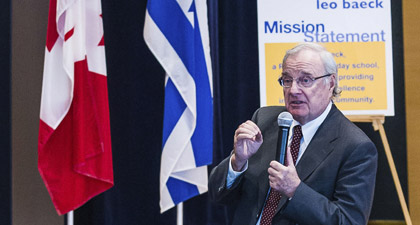TORONTO — When former prime minister Paul Martin visited the Leo Baeck Day School’s south campus earlier this month, he told the students that it is up to their generation to right the wrongs that have been inflicted on Canada’s First Nations people and pave a better future for all Canadians.
Martin chose to speak to the 250 middle school students from both of the Jewish day school campuses after he learned that the Union of Reform Judaism, with which Leo Baeck is affiliated, had passed a resolution focusing on addressing the plight of First Nations people in North America, said head of school Eric Petersiel.
“The resolution acknowledges our history as a Jewish People that suffered from discrimination, making it incumbent upon us to make the plight of the First Nations people in Canada a priority,” Petersiel said.
In what was more of an informal conversation than a lecture, Martin engaged the students in a discussion about Canada’s growing Aboriginal community.
“While First Nations are a minority, they are today the youngest and fastest growing segment of the Canadian population,” Martin said.
“They are growing, right now, four times faster than other Canadians. And they are of your generation. There are more members of the First Nations and Métis under the age of 15 than any other segment of the Canadian population.”
Martin said this growth will lead to a “fundamental shift” in Canadian society.
“My generation – and it was wrong for it happen – but we ignored it. Your generation will not. These will be the young men and women you will be working with,” he said.
“The only way that we are going to build a strong society is if we look at some things differently.”
Martin acknowledged the failure of the government-funded residential schools where Aboriginal children were abused and marginalized in an effort to assimilate them.
“Imagine if you were taken away from your home and your parents were given no choice… You went to the school, you were not allowed to practise your religion, and you were not allowed to speak your language… And if you tried to speak your language, they would wash your mouth out with soap. That’s what we did to the First Nations people for 150 years. And there are, today, literally thousands of people in this country who went to those schools,” he said.
“That means that the entire time I was in primary school, secondary school, college, law school… we did all of this, and these residential schools were going on, and we paid no attention. We paid no attention, and the last school only closed in 1996.”
He said that while the last residential school was closed in 1996, those schools were replaced with “a vastly inferior kind of education. That’s why we need to go to an action plan.”
He said promoting an action plan to address the needs of our aboriginal communities “is a responsibility of your parents to talk to you about it, but it is also your responsibility to talk to your parents about it. It’s the responsibility of your teachers to talk to you about it.”
Ignoring the growing Aboriginal community is no longer an option, Martin said, adding that in Saskatchewan, 45 per cent of all students going into Grade 1 next year are Aboriginal.
“I’m not going to be around when they are ready to take their place in this country. Who is going to be around when these students, who are now in Grade 8, who’s going to be around in this country when they are twice the population they are now and when no one who lives in Toronto will not have met an indigenous Canadian? Your generation,” Martin said.
“All of you have a tremendous opportunity to make this country a better country for your generation. Not for my generation, not for my parents’ generation, but for your generation, and you owe it to yourself.”
